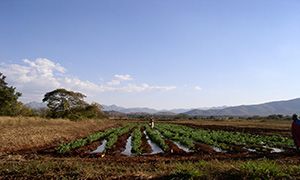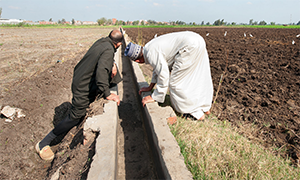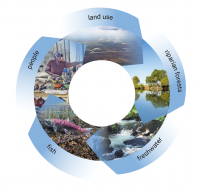With climate change profoundly affecting our economies, societies and environment, water is indeed the biggest deal breaker to achieve the internationally agreed water-related goals and targets, including those contained in the 2030 Agenda for Sustainable Development.Programme at a glance (105KB PDF)
- Side Events Programme - Inside UNHQ (5.6MB PDF) (full programme, 22-24 March)
- Side Events Programme - Outside UNHQ (full programme, 20-25 March) (# 58 p.)
- Side Events Programme - Virtual (20-25 March)
- Exhibitions Programme
The Conference, co-hosted by the Governments of Tajikistan and the Netherlands, will feature an opening and closing ceremony, six plenary meetings and five multi-stakeholder interactive dialogues. It will also feature a number of high-level special events and side events organized by Member States, the UN system and other stakeholders.
20/03. Groundwater: Potential and Pitfalls for Africa
Resources Germany; Ministry of Water and Sanitation Senegal; Ministry of Water and Environment
Uganda; IFPRI; African Union Commission; Gov. of Ethiopia; NEXUS Gains, ILSSI
The economy-wide benefits of accelerating groundwater development in Senegal and Uganda
Development of groundwater is key to accelerating agricultural and overall economic growth, fighting climate change, and generating employment in Africa. However, improvements in groundwater institutions are needed to increase equity and environmental sustainability in groundwater use. This session discusses the groundwater program of the African Ministers' Council on Water (AMCOW), including case studies on the benefits of groundwater development and institutional advances in several African countries.
- Moderator Claudia Ringler, Deputy Director of Environment and Production Technology Division, IFPRI
- The importance of groundwater development for water and food security in Africa H.E. Dr. Seleshi Bekele, Ambassador of Ethiopia to the US
- Africa’s groundwater development program Moshood Tijani, African Ministers' Council on Water
- Groundwater development potential in Africa Ramon Brentführer, Policy Advice Groundwater bei BGR, Federal Institute for Geosciences and Natural Resources
- The economy-wide benefits of accelerating groundwater development in Senegal and Uganda Angga Pradesha, Senior Scientist, IFPRI
- The groundwater governance toolbox: Elements to increase sustainability of groundwater use in Africa Hagar ElDidi, Senior Research Analyst, IFPRI
- Niokhor Ndour, Director of Resource Management and Planning, Ministry of Water and Sanitation, Senegal
- Julius Aheebwa, Water Officer, Ministry of Water and Environment, Uganda
- Mure Agbonlahor, Agricultural Production and Marketing Officer, African Union Commission
- Ruth Meinzen-Dick, Senior Research Fellow, IFPRI
20/03. Water & SDGs - Downscaling WATer relevant SDGs (DWAT-SDGs)
To support localizing SDGs, the International Water Resources Association is increasing support to SDG implementation through a task force committee (TFC) on Water & SDGs. The overall goal of the TFC is to downscale WATer-relevant SDGs (DWAT-SDGs) to the country/region, basin, and local scales to facilitate SDG realization and support sustainable management of water resources in a climate crisis.
This session will allow member countries to exchange existing tools and case studies linked to SDG 6 implementation and will develop suggestions and partnerships for expanding SDG 6 localization, making an important contribution to the Water Action Agenda.
- Moderator Claudia Ringler, Deputy Director of Environment and Production Technology Division, IFPRI
- Overview and introduction Ximing Cai, Ben Chie Yen Professor, University of Illinois, Urbana-Champaign
- A SDG localisation framework for guiding sustainable development leadership in the Australian water sector Paul Satur, Research Fellow and Lecturer, Monash University Sustainable Development Institute
- Localizing SDG6 in India: Where to start? Riddhi Singh, Associate Professor, Indian Institute for Technology Bombay
- How to localize SDG 6 in Egypt and the MENA Region: The role of the private sector Dahlia Sabri, International development practitioner, KEO International Consultants, Egypt
- Does SDG 6 matter in a water-abundant country like Brazil? Alcigeimes B. Celeste, Federal University of Sergipe, Brazil
- Discussant Raya Stephan, Water law expert, International consultant; Deputy Editor in Chief, Water International, International Water Resources Association (IWRA)
- Discussant Timothy Foster, Senior Lecturer in Water-Food Security, University of Manchester
21/03. Water for Sustainable Development: Innovative Solutions to the Water Crisis in Africa by International Centre for Leadership Development Nigeria
- Keynote Address on
Water Crisis
Peter David Pedersen -
Japan
Case studies from the 4Revs Innovation ecosystem
4Revs (= 4 Revolutions) is a platform run by Nelis, a non-profit organization that supports sustainability innovation (see below) by connecting young social entrepreneurs, social innovators, and sustainability practitioners - Water as a great paradox for human survival Overview on Water Cases in Africa Nkechika Ibe- Nigeria
- Water crisis in Cameroon: Challenges and Innovative Solutions Tantoh Nforba - Cameroon
- Water challenges in Tunisia: Challenges and Innovative Solutions Radhia Essamin - Tunisia
- Water issues focusing on Water filters Tanzania: Challenges and Innovative solutions Henry Kazula - Tanzania
22/03 Water Management in Action for Productive, Climate Resilient Food Systems
- USAID , German BMZ, EU, the Netherlands, Norad, and Sida
- This webinar explores how to sustainably scale irrigation systems in Asia, Africa, and the Middle East and North Africa to achieve sustainable water and food security while facing climate change.
- For business and industry, this session shares how to integrate sustainable irrigation practices and water efficiency into their operations and the food value chain.
- For the scientific and technological community, the session explores how research institutions and technology developers can contribute to better water management and security by researching basins and surface eater to help farmers and businesses improve monitoring and management while the technology community can help build better irrigation technologies that integrate different water management challenges.
- And finally, for farmers, this session highlights how the first two communities’ work must be to the benefit of the vulnerable smallholder farmers whose water usage and ability to grow food will be the most affected by climate change.
23/03 “Resilient Rivers: Counting Fish from Forests” on integrated watershed monitoring and management.
- FAO, Center for International Forestry Research (CIFOR)
- Presentations in this 90-minute side event describe collaborations across forestry and fisheries as a foundation for launching a new eLearning course, “Resilient Rivers: Counting Fish from Forests” on integrated watershed monitoring and management. Speakers include colleagues from Colombia, Zambia, Japan, and Sweden
- Mr. Davison Gumbo, Senior Scientist, CIFOR, Zambia. Social and ecological linkages across watersheds
- Ms. Malin Ingemarsson, International Policy and Water for Resilient Landscapes, Swedish Water House, Sweden
- Mr. Toru Nakamura, Deputy Director, Conservation Division, Forestry Agency, MAFF, Japan. Contribution of Forests to Fisheries’ environment - Model Analysis for Water, Soil, and Nutrient Runoff
- Ms. Sandra Hernández, Fundación Humedales, Colombia, Fisheries and forests in the Magdalena and Atrato River Basins, Colombia, South America
- Video – Resilient Rivers: Counting Fish from Forests
- Launch of eLearning Ms. Ashley Steel, Livelihoods, Production & Trade Statistics Team (Forestry Division, FAO)
24/03 Small-scale irrigation in the Sahel: Climate action
- World Bank, Minister of Agriculture, Animal and Fisheries - SIIP/Burkina Faso, Minister of Agriculture -SIIP/Niger, Ministry of Agriculture, Rural Equipment and Food Sovereignty - SIIP/Senegal
- The side event will consist of a panel with representatives from Burkina Faso, Niger, and Senegal, moderated by the World Bank.






No comments:
Post a Comment